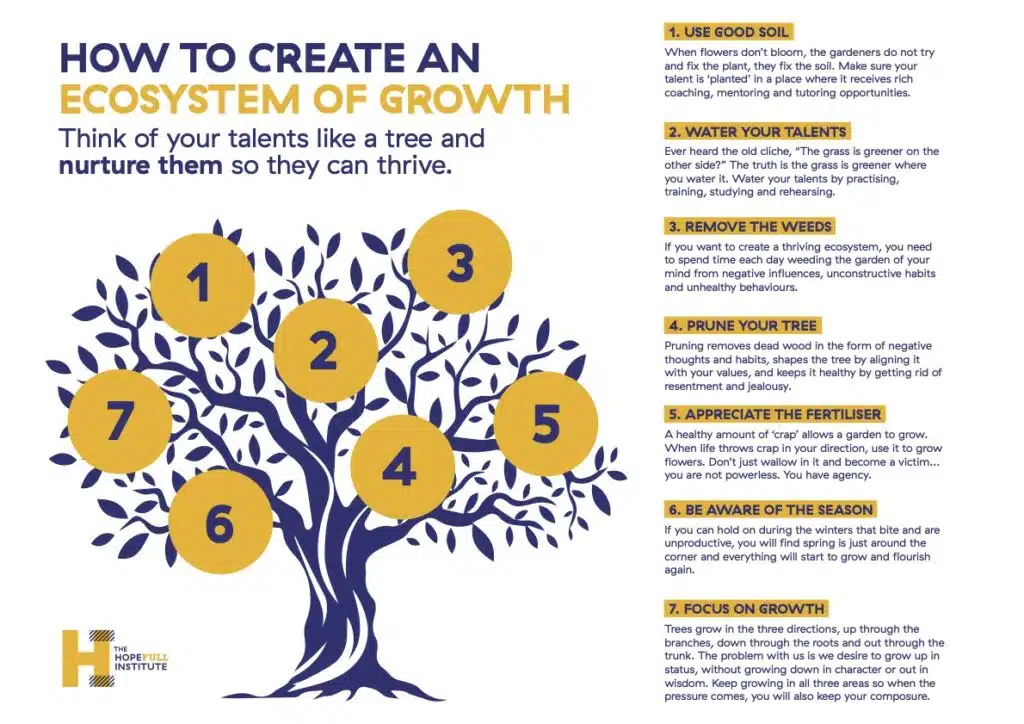Think of your talents and unique gifts like a tree and take the following steps to nurture it and ensure it grows and thrives.
Psychologists define talents as recurring patterns of thoughts, feelings or behaviours that can be productively applied.
Because of this definition, I am convinced everyone has within them a healthy degree of primal greatness as well as superpowers that if harnessed correctly will enable them to flourish emotionally, physically and psychologically.
Most innate gifts or talents begin as inconsequential or insignificant metaphorical seeds. For these seeds to grow into healthy strong ecosystems capable of sustaining abundant life, you must follow certain steps.
Below are 7 ways to harness your inner potential and create a culture where it can thrive.
1. Plant your ‘gift’ in good soil
For your gift to flourish it must first be planted in fertile soil.
When flowers don’t bloom, the gardeners do not try and fix the plant, they fix the soil.
Make sure your gift is ‘planted’ in a place where it receives rich coaching, mentoring and tutoring opportunities. Michael Jordan only won an NBA championship when he was coached by Phil Jackson. Even a gift like his had to be placed in a great environment to properly flourish, and we all know it wasn’t just the coach, the other players and the organisation all played a role in creating an ecosystem for him to flourish.
2. Water your gift
Your gift cannot be planted and then left alone. It must receive the necessary water and by that, I mean you have to practice, train, study and rehearse. Regularly watering your seed will ensure it is hydrated and safe from wilting.
Watering your gift on a daily basis is what will make it grow and reach its full potential.
Ever heard the old cliche, “The grass is greener on the other side?” The truth is the grass is greener where you water it.
This is one of the disadvantages of social media. Most people are spending all their time watering other people’s gardens. Constantly scrolling other people’s feeds only boosts their likes and influence – I am sure they are thankful for the support, but ideally you should be working on your goals as well. The best thing we can do is stay in our lane and water our own garden.
3. Get rid of the weeds
Weeds are resilient and grow quickly, eventually smothering the life out of other plants. If left unchecked, they can disrupt a tree’s growth, blocking out needed sunlight and nutrients.
If you want to create a thriving ecosystem, you need to weed the garden of your mind from negative influences, unconstructive habits and unhealthy behaviours.
Take hold of your thoughts before our thoughts take hold of you and drag you to dark places.
If I had a wound and I kept picking at it continually, that wound would gradually become infected and sore. Left unclean, it would start to fester and develop slimy pus. As gross as that sounds, that is exactly what we do to our minds when we pick at and dwell on a past pain. We can get ourselves into a funk because we fill our minds with junk.
Negative thoughts will inevitably present themselves, but you can manage these thoughts. It’s within your power to release that pessimism when it arises. It’s okay for a bird to fly over your head but you would never allow it to make a nest in your hair. In the same way, thoughts can circle around you, and what takes root can either hinder or help you move forward.
Stay positive! Cynicism is the death of creativity.
Cleanse your mind by planting seeds of hope rather than despair. It is far better to focus and amplify the positive things in your life rather than the negative. Don’t keep watering your destructive thoughts, instead meditate on positive ideas and keep those growing.
You have the power to manage and direct your thoughts. Don’t let them become harsh and unbridled; tame them and direct them towards your goals. A positive mindset may not create talent, but it will release it.
4. Prune when necessary
To prune a tree means to selectively remove parts of the branches, or roots. Here are three reasons to do this:
a) Remove the deadwood. Occasionally, parts of the tree will start to die or decay. Dead branches are prone to falling or breaking off and they are a safety concern. What are the areas in your life that have become dead wood and are now impacting your safety? They could be addictions, bad habits or past mistakes. Be brutal and remove the limbs before they do damage to yourself or other people.
b) Shaping. The second reason for wanting to prune a tree is to control or direct the growth of the tree. Sometimes we need to cut things from our lives that are not leading us in the direction we want to go. Once you know who you are, it becomes easier to shape your life according to your values. Training a plant or your life to grow in a certain area can be difficult. It is better to remove distractions so you can focus solely on your goal.
c) Health. The third reason someone would prune a tree is for health reasons. Sometimes you need to trim a diseased part of the tree before it starts to infect other areas. Resentment or jealousy must be removed, to maintain the health of your soul.
5. Fertiliser makes you grow bigger, faster
A tree must be fertilised to get to a new stage of growth. There is no polite way to say this, but fertilising is nothing more than being dumped with a pile of manure. As distasteful as it sounds it’s necessary for growth.
In life, you will go through seasons where you feel like you are being pounded with a mountain of manure. Life seems to stink, it’s hot and uncomfortable. And the smell lingers!
Manure creates nutrient-rich soil, but it is a balancing act. If a plant receives too much manure, it can lead to toxicity. Alternatively, inadequate amounts of manure leads to deficiencies.
So, what is the right amount of crap you need in order to grow?
That is a tough question to answer. Nobody wants someone to go through a difficulty or a challenge. When I was 17, I was diagnosed with an incurable disease called Ulcerative Colitis, it’s a tough illness which for the last 20 years has placed me on a merry-go-round of wellness and sickness. I have gone through many cycles of remission and full-blown chronic illness and suffered many long days with the side effects. It is not something I would wish on anybody. Yet the battles I have gone through have forged within me grit and resolve I would not have received any other way.
Would you watch a movie where the protagonist in the story had no challenges, tension or obstacles? That would be a boring story. What makes life interesting is the struggles and tensions we experience.
In the book ‘Good to Great’ – Jim Collins talks about the Hardiness Factor. He says all good to great companies have it. Research done by the International Committee for the Study of Victimisation found people who had suffered from serious adversity fell into three categories:
i) Those who were permanently dispirited by the event
ii) Those who got their life back to normal
iii) Those who used the experience as a defining event that made them stronger
When life throws crap in your direction, use it to grow flowers. Don’t just wallow in it and become a victim… you are not powerless.
Don’t allow yourself to internalise the crap and become full of self-pity. Self-pity rots the soul and leaves you ambivalent. John W. Garner once said, “Self-pity is easily the most destructive of the non-pharmaceutical narcotics; it is addictive, gives momentary pleasure and separates the victim from reality.”
So never allow yourself to be separated from reality. Face the facts and deal with them with a hopeful and optimistic mindset.
“The fairest thing in nature, a flower, still has its roots in earth and manure.” – D. H. Lawrence
6. Be aware of what season you are in
The greatest key to success is recognising what season you are in. Life is not linear or fluid, life does not occur in a straight line of unhindered progress. Every year is full of ups and downs, ebbs and flows, peaks and valleys. The trick is to not get stuck in a season. If you can hold on during the dark winters when it looks like nothing is happening, your PBs are not improving, your assignment results are not improving and everything around you seems barren and unproductive, don’t give up hope.
Spring is just around the corner and everything will start to flourish again. Don’t ever let the dark clouds tell you the sun is not shining because up above them, it is. Be patient; the dark rain clouds will part, and the light of your release will remain unmoved.
Remember also that there are seasons within seasons. There is night and day, afternoons and evenings, weekdays and weekends. In some places, you can experience all four seasons in a day.
If you can hold on during the winters that bite and are unproductive, you will find spring is just around the corner and everything will start to grow and flourish again.
Don’t be envious of another person’s season because every season has a struggle, with a combination of sprouting and stagnation. Ecclesiastes 3:11 says, “He has made everything beautiful in its time.” This moment right now is beautiful; look around you or out your window and become mindful of all the good that is surrounding you today.
Embrace the moment you are in and don’t wish it away. The season that you think has what you want is still going to lack something. Many people live wishing their whole life away. They think ‘if I can just, turn 10, everything will change’ or ‘if I can just turn 16 everything will be different’ or ‘if I can just get through school then I will start chasing my dream’ or ‘if I can just finish this degree, or get married, or have a child, or when the kids grow up, or when the kids leave home, when I pay off the house, when I retire’. Then when you retire you sit back and sigh, “If I could just be young again.”
The day to act is today, no matter what season you find yourself in. Every season will have its struggle. You don’t have to be envious of anybody else. Just because it’s easy to see their fruit but you don’t often get to see their fight. Life is best lived in full engagement so embrace the season you are in. Don’t put off tomorrow what you should do today.
7. Be intent on growing
To grow means to push past your comfort zone. We need to allow ourselves the right amount of pressure to cause growth. If you have too much pressure, the bone would break. Too little pressure and it starts to deteriorate. We need to give ourselves opportunities to stretch ourselves beyond our current capacity and to grow. Let me ask you this question, when weight training, does the muscle grow the most on the 1st rep on the 10th? The answer is the 11th rep. It’s when you push past the point of failure and the pressure is most intense that you experience the greatest amount of growth.
Here’s another metaphor to fire up growth. Trees grow in the three directions, up through the branches, down through the roots and out through the trunk. Growing in all three directions provides stability, strength, and balance, so when the pressure comes you don’t break down.
The problem with us is we desire to grow up in status, without growing down in character or out in wisdom. Keep growing in all three areas so when the pressure comes, you will also keep your composure.
Once you have been patient enough to wait for the flowers to grow, you must wait a little longer for the fruit to grow and ripen. Then you sit under the shade of your tree, and you can pick the fruit, eat it and be fulfilled.
The fruit of your life is what you have laboured long and hard for. The fruit you produce in your life will reflect who you are and the character and values that have shaped your life.
The key to wellbeing is that you are fruitful, flourishing and fulfilled.


